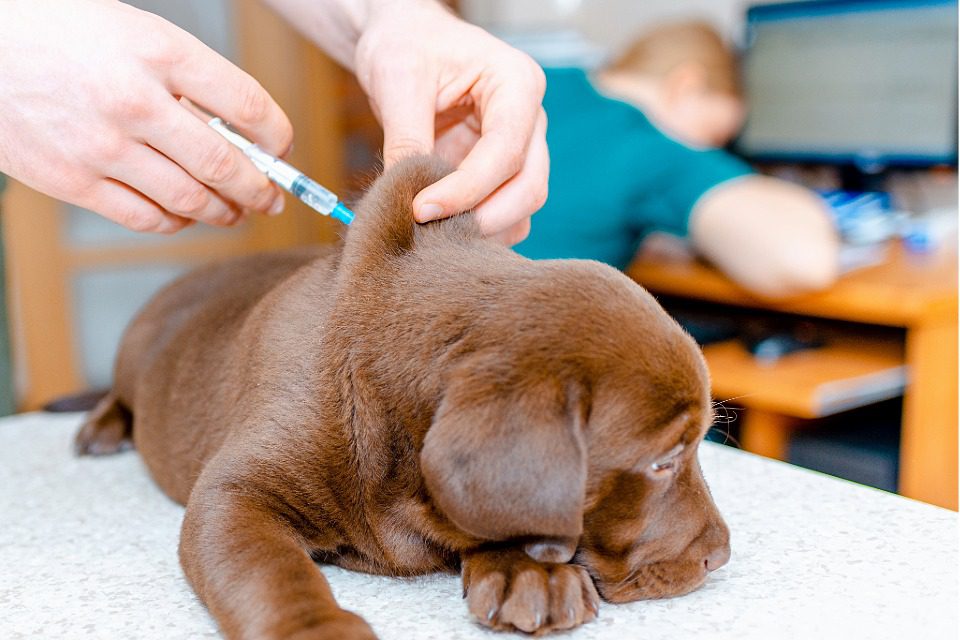New Puppy Care in West Branch, MI
Setting the Foundation
for a Healthy, Happy Puppy
Setting the Foundation for a Healthy, Happy Puppy
Congratulations on your new family member! This is a very exciting time for your family and we want to help you make it as fun and stress-free as possible. On this page, you will find information about how you can help keep your pet as healthy, safe and happy for as long as possible.
Our team is here to help you care for your puppy from day one. Call (989) 701-2929 or schedule your puppy's appointment online.
Getting Started with Your New Puppy
Adding a new puppy to your family is an exciting milestone, but puppies come with many responsibilities. Keeping puppies safe, healthy, and happy requires dedication and commitment, especially during the first few months. Protecting your pup from preventable diseases is an important consideration during this time, starting with their first veterinary visit.
Vaccinations should begin as soon as possible after bringing your new puppy home. Vaccines help teach a pet’s immune system to recognize and fight serious infections, helping to safeguard their health. All puppies require a series of vaccinations, necessitating frequent vet visits.
A puppy’s first experiences at the vet are crucial for their ongoing health and wellness. Here is an overview of the puppy vaccination process, including what to expect during your pup’s vaccination visits.
Our team is here to help your puppy grow and thrive. Call (989) 701-2929 or request an appointment for your puppy online by clicking the link below.

How do puppy vaccines work?
Vaccines introduce the immune system to an inactivated pathogen, typically a virus or bacterium. The immune system then produces antibodies against the pathogen as if fighting an actual infection. If the puppy is exposed in the future, their body remembers and can fight the pathogen more efficiently than an unvaccinated puppy. Vaccination is crucial for young puppies because their immune systems are still developing.

How do puppy vaccines work?
Vaccines introduce the immune system to an inactivated pathogen, typically a virus or bacterium. The immune system then produces antibodies against the pathogen as if fighting an actual infection. If the puppy is exposed in the future, their body remembers and can fight the pathogen more efficiently than an unvaccinated puppy. Vaccination is crucial for young puppies because their immune systems are still developing.

Recommended Puppy Vaccines
Your veterinarian can determine the vaccines your puppy needs according to their expected lifestyle and exposure risks. Here’s an overview of the most common vaccinations recommended during puppyhood:

-
Distemper
Distemper is an often fatal virus affecting the respiratory, gastrointestinal (GI), and nervous systems.
-
Parvovirus
Parvo causes life-threatening GI distress coupled with immune system suppression. The virus that causes parvo can live in the environment for years, making vaccination critical.
-
Adenovirus
This virus causes infectious hepatitis, or liver inflammation, which can be fatal.
-
Leptospirosis (Lepto)
A waterborne bacterial disease that is potentially fatal. Can cause fever, jaundice, kidney failure, and liver failure. Leptospirosis is zoonotic, which means it can spread from animals to people.
-
Rabies
Rabies is fatal in pets and humans and can be transmitted through an infected animal’s bite. Rabies vaccinations are required by law in Michigan.
-
Lyme disease
Lyme disease is transmitted by infected ticks and can lead to joint inflammation and kidney damage.
-
Kennel Cough (Bordetella)
While not typically life-threatening, upper respiratory infections are common and highly contagious among social dogs and can be particularly devastating for dogs with underlying respiratory disease.
-
Influenza (Canine Flu)
Canine influenza causes coughing and lethargy that can progress to pneumonia.
-
Distemper
Distemper is an often fatal virus affecting the respiratory, gastrointestinal (GI), and nervous systems.
-
Parvovirus
Parvo causes life-threatening GI distress coupled with immune system suppression. The virus that causes parvo can live in the environment for years, making vaccination critical.
-
Adenovirus
This virus causes infectious hepatitis, or liver inflammation, which can be fatal.
-
Leptospirosis (Lepto)
A waterborne bacterial disease that is potentially fatal. Can cause fever, jaundice, kidney failure, and liver failure. Leptospirosis is zoonotic, which means it can spread from animals to people.
-
Rabies
Rabies is fatal in pets and humans and can be transmitted through an infected animal’s bite. Rabies vaccinations are required by law in Michigan.
-
Lyme disease
Lyme disease is transmitted by infected ticks and can lead to joint inflammation and kidney damage.
-
Kennel Cough (Bordetella)
While not typically life-threatening, upper respiratory infections are common and highly contagious among social dogs and can be particularly devastating for dogs with underlying respiratory disease.
-
Influenza (Canine Flu)
Canine influenza causes coughing and lethargy that can progress to pneumonia.
Distemper, parvovirus, adenovirus, leptospirosis, and rabies are core vaccines recommended for all puppies. Other vaccines are administered on a case-by-case basis, depending on risk and lifestyle.
Puppy Vaccination Schedule
Puppies typically begin their vaccination series at 8 weeks old, with follow-up vaccinations every two to four weeks until they are at least 16 to 20 weeks old. Pups getting extra lifestyle-based vaccines may require additional visits, and your veterinarian will adjust this schedule based on individual needs.
Puppies require a series of vaccinations because the maternal antibodies they acquire from nursing only offer temporary protection. These antibodies will also block the puppy’s ability to develop its own immunity, making vaccines less effective if not administered within the recommended time frame. Giving multiple boosters ensures that each puppy develops strong, lasting protection as the maternal antibodies gradually fade.


Getting started: A Puppy Vaccination Checklist
Your puppy’s path to lifelong health starts during their first months. Use this checklist to ensure you remember these important stepping stones:
Puppy Care Resources
Click the links below for additional resources for puppy care.




